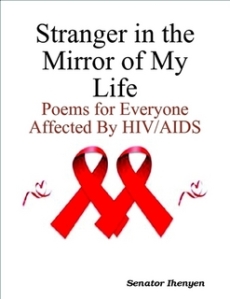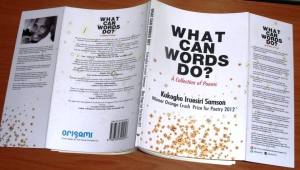
Poems for Everyone Affected by HIV/AIDS
Title: Stranger in the Mirror of My Life: Poems for Everyone Affected by HIV/AIDS
Author: Senator Ihenyen
Genre: Poetry
Publisher: Lulu
ISBN: 978-1-304-64806-8
Number of Pages: 93
Publication date: November, 2013
“Stranger in the Mirror of My Life” is a collection of poems about the HIV/AIDS pandemic, which tend to differ from the general norm essentially in terms of concept. In arranging the themes, the motive is to estrange the anthology away from the customary settings of periods and styles, to that of experiences and phases in the reality of the matter. Although the former is natural and valid, the latter guides the reader to a sense of awareness for those affected by HIV/AIDS and a feeling of compassion for those infected with the virus. The book offers a unique perspective to the campaign for HIV/AIDS awareness, control, and or eradication.
Poetry like every other form of art is a formidable and veritable tool for social mobilisation, emancipation and awareness. Over the years, from the era of great poets like Alexander Pope, Clare, Shakespeare, to more contemporary poets like Wole Soyinka, Denis Brutus, Chinua Achebe and a host of others, poetry has being used as an instrument of moral justice and societal upliftment. In this epic lineage of gifted literary scholars the world over, comes the erudite young Nigerian writer/poet, lawyer per excellence. Senator Ihenyen, as named at birth holds the view that with regards to the HIV/AIDS scourge, the cure that the world seek is hidden in the heart of mankind and that cure is love. “Stranger in the Mirror of My Life” is a clarion call to the human race for compassion and empathy in dealing with the epidemic facing humanity.
Up until the early 1980s, little or nothing was known globally about HIV/AIDS. Silent, yet ravaging infection- was the dominant feature in the earliest advent of the virus, owing to the fact that human immunodeficiency virus (HIV) was alien to the global community and its transmission was not followed by visibly noticeable signs and symptoms. However, prior to the 1970s, in rare cases, reports of AIDS alongside sero-archaeological studies have documented instances of the infection in humans. Available records tend to suggest that the HIV/AIDS pandemic had began in the mid to late 1970s. The early 1980s saw the rapid spread of HIV to about five continents which included: North America, South America, Europe, Africa and Australia. The spread continued due to lack of awareness and preventive measures, approximately 100,000-300,000 persons were infected at the time.
In the past three decades since the first cases of HIV/AIDS were reported, the figures have increased astronomically and global impact of the scourge has being alarming most especially in sub-Saharan Africa.
Global statistics showed that in 2011, worldwide figure of people living with HIV was estimated at 34 million, two-third of this figure was domiciled in the sub-Saharan African region. Significant discoveries have being made in medical research in the area of HIV/AIDS treatment and control. A cure has not being found yet. The introduction of antiretroviral therapy has greatly helped in reducing the number of AIDS-related deaths, especially in the last five years. However, the occurrence of new infections is still an enormous challenge the world over. Sub-Saharan Africa has seventy two percent of the world’s total population of people living with HIV, although the region has a little more than twelve percent of the world’s population. The epidemic has caused a colossal amount of suffering in the African continent. The most palpable effect of this global scourge has been illness and death, but the impingement of the pandemic has stretched across all spheres of life including economy, social capital and population structure and so on.
The extent of spread of human immunodeficiency virus has surpassed all expectations in the last two decades. Presently, an estimated 36 million people are currently infected with HIV, around the region of 20 million people have so far died from AIDS related illnesses, worst hit is indeed sub-Saharan Africa. Responding to HIV/AIDS at a level proportionate to the stupendous impact of the scourge is an urgent global imperative, sustained global mobilization is a sine qua non to combat one of the most severe crises facing human development. “Stranger in the Mirror of My Life” is a commitment to this global effort.
Stigmatisation, discrimination, alienation and antipathy are some of the societal ills that have made life extremely difficult for people living with HIV. The animosity in the chore of mankind against people living with HIV is stronger and even more infectious than the virus itself. Quoting from Senator Ihenyen’s poem titled “In a Free Fall”:
Why have you suddenly become
The virus
Ravaging the blood of my love for you
In my breaking heart
The expression above tends to suggest that the rejection faced by HIV positive people may be even more challenging than the infection itself. Misconception, ignorance and pre-conceived notions has been the bane of this pandemic, in typical human characteristics, what defiles understanding is ascribed religious and spiritual pigmentation. Quoting from the poem titled “I am HIV-AIDS” by the African poet Simon M. Matlou:
Saint Luke predicted me long time ago,
While the Book of Revelation warned you about me
I am raging like a wild fire,
I am growling like a lion,
I have spotted you and I will pounce on you!
I am HIV/AIDS!
Views like this and even more extremist views have complicated even further the HIV/AIDS challenge, labeling the infection a plague from a supernatural power will unjustly indict and victimize those who are infected. HIV/AIDS is clearly a global health challenge and any religious coloration, segregation, sectionalization and regionalization will lead the world to a Pandora’s Box. Without attempting to sound mythical, the panacea or catholicon to this nemesis is universal love. The hate virus has eaten deep into the fabric of mankind, perhaps, someday, the world shall witness a paradoxical twist when this HIV challenge that we all face becomes a catalyst for engendering global peace and universal love.
Like earlier mentioned, stigmatisation resulting from ignorance and prejudice has being one of the most challenging issues faced by people living with HIV, the fear of stigmatisation is one of the major reasons why a lot of people refuse to perform HIV test, a number of people living with HIV, for reasons of victimization and stigmatisation fail to come out in the open to seek help. “Stranger in the Mirror of My Life” is a conscious effort to inspire confidence and courage in people living with HIV to come out boldly in the sun set to face the challenges confronting their existence.
“Stranger in the Mirror of My Life” cuts across its readers as a delicate voice, with sober and poignant views often cryptical in nature. In x-raying this verse from the poem titled “Once upon a Simple Question” by Senator Ihenyen:
If there was no blood running in my veins
How would you be taking my life away from me now?
The expression above bears more depth beyond the immediate perception, perhaps something for the scientist and researchers to ponder upon, whereas, on the face-value, the expression suggests the lamentation of a dying victim.
An obviously conspicuous attribute of the poet like most African writers is his occidental indulgence as well as his Mallarme influence strongly represented in the poet’s persistent use of symbolism, a concept that is tentatively labelled in the African literary parlance as ‘animism”. However, as Prof. Soyinka would say, “A distinct quality in all great poets does exercise a ghostly influence in other writers”, reading the works of Senator Ihenyen does calls to mind the works of great African love poets like Denis Brutus who wrote such raw and passionate lines of love as well as of indictment, conveying the concepts of fundamental justice, indicting the society of outer defiance, preaching hope and resolve all in one breath.
History, the contemporary reality and the vision of an HIV free generation is the overriding interest of this collection, in introducing “Stranger in the Mirror of my Life” to readers across the globe, I would like to say that it is indeed a compendium and a companion for all people living with HIV and the rest of the world.
Osamede Osunde
Chief Editor-
Pen Aesthetics lit. Agency
First published on the Saturday Sun, January 11, 2013.
‘Stranger in the Mirror of My Life: Poems for Everyone Affected by HIV/AIDS’ is now selling in Nigeria at http://
http://www.ysghubs.com/w/book/show/61-Stranger for 474 naira (5% slash from 500 naira) this December. It is also internationally available at http://www.lulu.com/spotlight/Strangerinthemirrorofmylife for $3.75 only!








